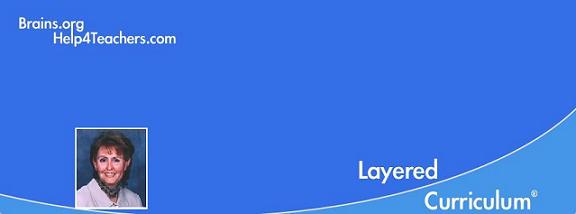__________Layered Curriculum®. . . because every child deserves a special education™_
 |
|
![]() _
_ ![]()
Layered
Curriculum TEXT & WORKBOOK
Set
for only
$43.95
(free shipping in
US)
Tweet
Stress- A Land Mine for the Brain
© 2013 Dr Kathie NunleyStress is more than just uncomfortable, it's dangerous to the mind and body. In addition to increasing health problems, chronic stress causes problems with our memory systems, blood pressure, problem solving skills, and thought processes in that decision-making region of the brain known as the prefrontal cortex.
Although some teachers feel stress is an inevitable part of the education process, research shows that stress, past a moderate level, can actually undermine the learning process. Stress in the classroom or elsewhere, raises dopamine activity in the prefrontal cortex. This increased dopamine activity (DA) has been linked to disruptions in working memory. High DA causes the brain to shift to an "escapte from threat" mode. It then reduces a person's desire to explore new ideas and creatively solve problems. While students under stress will work "harder", the quality of the work decreases. The higher the stress, the worse the results. Short term memory is crippled, the student has a difficult time retrieving previous information from memory and decision making ability decreases.
Obviously, we wouldn't want to remove all stress from life, as a small amount can help keep arousal levels high enough to complete a task. But large amounts, particularly when the stress causes accompanying feelings of fear and anxiety, are dangerous and work against the learning process.
Be careful in the classroom. A little excitement and encouragement built on a strong foundation of trust and care can help build enthusiasm for doing well. An environment perceived as intimidating, frightening and overwhelming can shut the learning process down.
Recently while visiting a graphic design class, I saw a poster on the door to the special effects lab that read "don't make a garlic sandwich". I love that thought. It helps remind us that some things are only good in very small quantities.
References:
Arnsten, Amy F. T.; Murphy, Beth; Merchant, Kalpana, (2000, Oct) The selective dopamine D4 receptor antagonist, PNU-101387G, prevents stress-induced cognitive deficits in monkeys, Neuropsychopharmacology. Vol 23(4) 405-410.
Brand, Nico; Hanson, Eamonn; Godaert, Guido, (2000, Aug) Chronic stress affects blood pressure and speed of short-term memory, Perceptual & Motor Skills. Vol 91(1) 291-298.
Dent, Mary F.; Neill, Darryl B. (2012, Oct) "Dose-dependent effects of prefrontal dopamine on behavioral state in rats." Behavioral Neuroscience, Vol 126(5), 620-639
Morrow, Bret A.; Roth, Robert H.; Elsworth, John D, (2000, Aug) TMT, a predator odor, elevates mesoprefrontal dopamine metabolic activity and disrupts short-term working memory in the rat., Brain Research Bulletin. Vol 52(6) 519-523.
Tohill, Jean M.; Holyoak, Keith J, (2000, Feb) The impact of anxiety on analogical reasoning, Thinking & Reasoning. Vol 6(1) 27-40.
Tuinstra, T.; Verheij, M.; Willemen, A.; Iking, J.; Heeren, D. J.; Cools, A. R., (2000, Dec) Retrieval of spatial information in Nijmegen high and low responders: Involvement of beta-adrenergic mechanisms in the nucleus accumbens, Behavioral Neuroscience. Vol 114(6) 1088-1095.
About the Author:
Dr Kathie Nunley is an educational psychologist, researcher and author of several books on parenting and teaching, including A Student's Brain (Brains.org) and the best selling, "Differentiating the High School Classroom" (Corwin Press). She is the developer of the Layered Curriculum® method of instruction and has worked with parents and educators around the world to better structure schools to make brain-friendly environments. In addition, her work has been used by the Boeing Corporation, Family Circle Magazine, the Washington Post, and ABC television.
Email her: Kathie (at) brains.orgCopyright © 1998 - current year by Kathie F. Nunley.
All Rights Reserved.
Layered
Curriculum is a registered trademark developed by
Dr. Kathie F. Nunley.